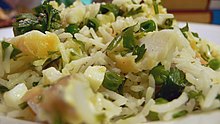Kedgeree
Kedgeree (sometimes spelled kitcherie , kitchari or kitchiri ) is a dish that is particularly popular in England .
It consists of fish (mostly smoked haddock ), boiled rice , eggs, and butter. Originally, chopped leek was also often added; today it is usually seasoned with curry powder or turmeric and coriander and refined with cream or yoghurt.
history
Kedgeree is a dish from Anglo-Indian cuisine, so it was invented by the English colonial rulers in India . The name goes back to the Indian dish khichri , which is prepared from rice, dal , butter, onions and spices. Fish and boiled eggs were originally just side dishes, but according to the colonial rulers they soon became basic ingredients of a successful kedgeree . It was originally mainly eaten for breakfast, because the fish caught early in the morning should be as fresh as possible on the plate. It was mostly served in high society. In Victorian times the court became well known in the motherland; William Somerset Maugham is said to have said: "To eat well in England, one should have breakfast three times a day, and not without kedgeree."
Movie
- The brisk Scot. Documentary film, Germany, France, Austria, 2012, 43 min., Director: Florian Schewe, production: arte , zero one film, ORF , series: The culinary adventures of Sarah Wiener in Great Britain. (Episode 3 of 10), first broadcast: June 13, 2012, film information from arte with prescription .
Web links
- How to cook perfect kedgeree. - Felicity Cloake posted a blog post in the Guardian , February 24, 2011.
- Kedgeree - recipe from Jamie Oliver
Individual evidence
- ↑ Kedgeree, Kitchery, p. ( Memento of the original from July 15, 2012 in the web archive archive.today ) Info: The archive link was inserted automatically and has not yet been checked. Please check the original and archive link according to the instructions and then remove this notice. In: Henry Yule , Arthur C. Burnell: Hobson-Jobson. A glossary of colloquial Anglo-Indian words and phrases, and of kindred terms, etymological, historical, geographical and discursive. New edition, edited by William Crooke . J. Murray, London 1903, p. 476.
- ↑ Elizabeth M. Collingham: Curry. A tale of cooks and conquerors. Oxford University Press, Oxford et al. 2006, ISBN 0-19-517241-8 , p. 119.
- ^ Elizabeth M. Collingham: Imperial bodies. the physical experience of the Raj, c.1800-1947. Polity Press et al., Cambridge 2001, ISBN 0-7456-2370-0 , p. 72.
- ↑ Cecilia Leong-Salobir: Food Culture in Colonial Asia. A Taste of Empire. Routledge, London et al. 2010, ISBN 978-0-415-60632-5 , p. 18.
